Mises, Ludwig von. Human Action: A Treatise on Economics
Подождите немного. Документ загружается.

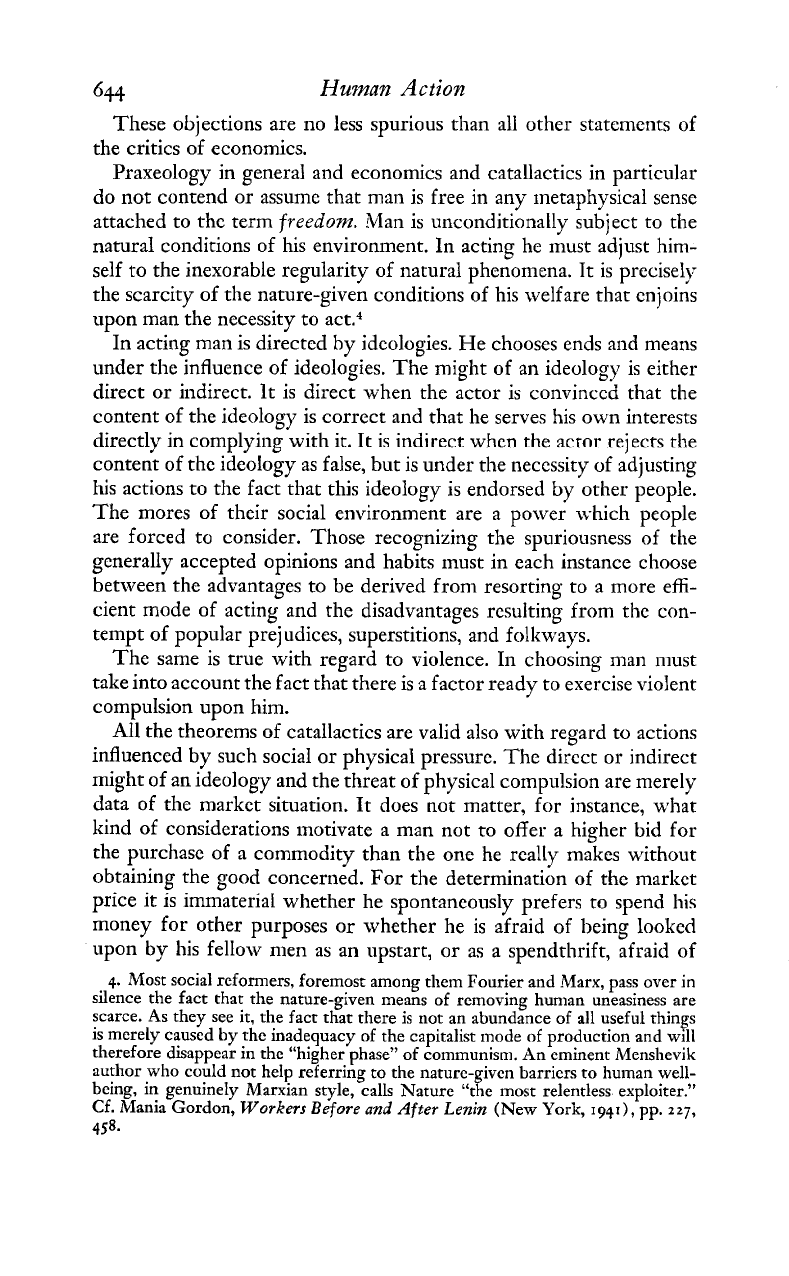
644
Human
Action
These objections are no less spurious than all other statements of
the critics of economics.
Praxeology in general and economics and catallactics in particular
do not contend or assume that man is free in any metaphysical sense
attached to the term
freedom.
Man is unconditionally subject to the
natural conditions of his environment. In acting he must adjust hirn-
self to the inexorable regularity of natural phenomena. It is precisely
the scarcity of the nature-given conditions of his welfare that cnjoins
upon man the necessity to act.'
In acting man is directed by ideologies. He chooses ends and means
under the influence of ideologies. The might of an ideology is either
direct or indirect. It is direct when the actor is convinced that the
content of the ideology is correct and that he serves his own interests
directly in complying with it. It is indirect when the actor rejects the
content of thc ideology as false, but is under the necessity of adjusting
his actions to the fact that this ideology is endorsed by other people.
The mores of their social environment are a power xvhich people
are forced to consider. Those recognizing the spuriousness of the
generally accepted opinions and habits must in each instance choose
between the advantages to be derived from resorting to a more effi-
cient mode of acting and the disadvantages resulting from the con-
tempt of popular prejudices, superstitions, and folkways.
The same is true with regard to violence.
In
choosing man must
take into account the fact that there is
a
factor ready to exercise violent
compulsion upon him.
All the theorems of catallactics are valid also with regard to actions
influenced by such social or physical pressure. The direct or indirect
might of an ideology and the threat of physical compulsion are merely
data of the market situation. It does not matter, for instance, what
kind of considerations motivate a man not to offer a higher bid for
the purchase of a commodity than the one he really makes without
obtaining the good concerned. For the determination of the marlrct
price it is immaterial whether he spontaneously prefers to spend his
money for other purposes or whether he is afraid of being looked
upon by his fellow men as an upstart, or as a spendthrift, afraid of
4.
Most social reformers, foremost among them Fourier and Marx, pass over in
silence the fact that the nature-given means of removing human uneasiness are
scarce. As they see it, the fact that there is not an abundance of all useful things
is merely caused
by
the inadequacy of the capitalist
node
of
production and will
therefore disappear in the "higher phase" of communism. An eminent Menshevik
author who could not help referring to the nature-given barriers to human well-
being, in genuineIy Marxian style, calls Nature "the most relentless exploiter."
Cf.
Mania Gordon,
Workers Before and After Lenin
(New York,
1941
),
pp.
227,
458.
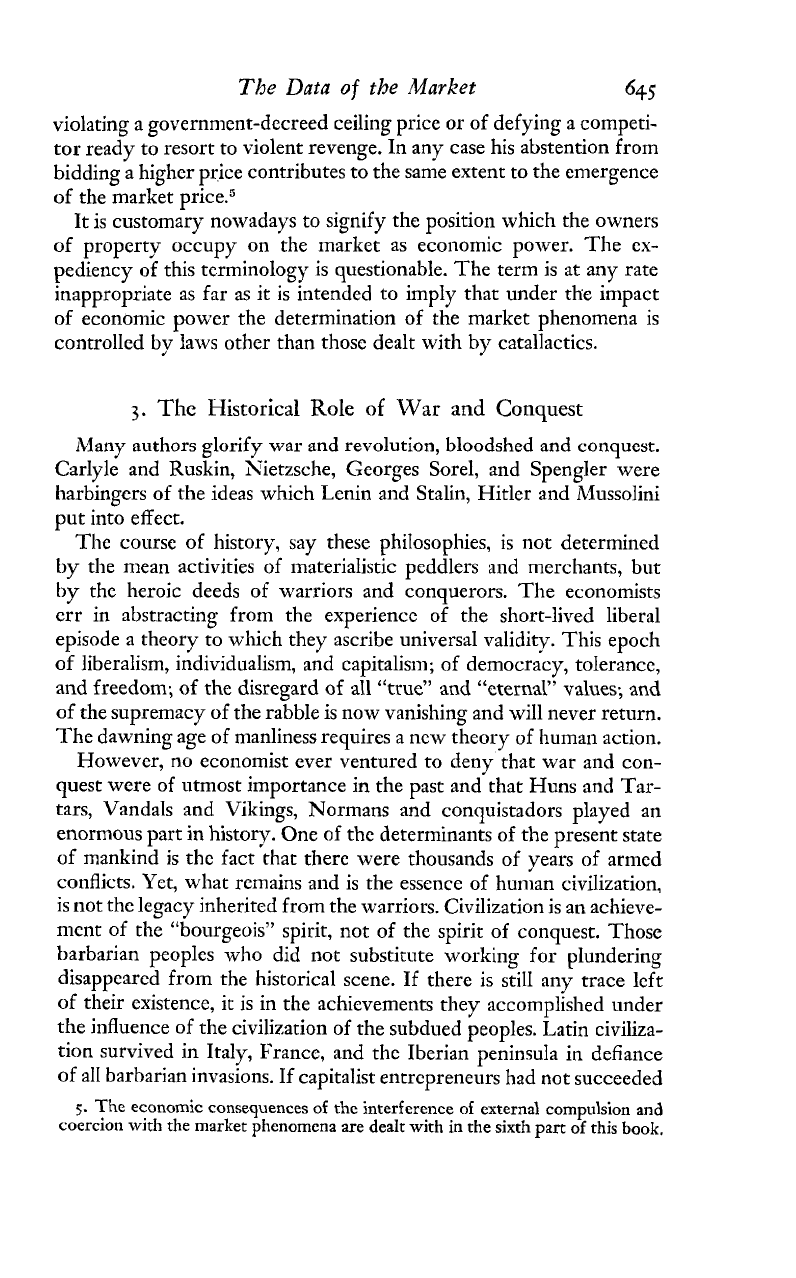
The
Data
of
the
Market
violating a government-decreed ceiling price or of defying a competi-
tor ready to resort to violent revenge. In any case his abstention from
bidding a higher price contributes to the same extent to the emergence
of the market price."
It is customary nowadays to signify the position which the owners
of property occupy on the ~narket as economic power. The ex-
pediency of this terminology is questionable. The term is at any rate
inappropriate as far as it is intended to imply that under the impact
of econon~ic power the determination of the market phenomena is
controlled by laws other than those dealt with by catallactics.
3.
The
Historical Role
of
War
and Conquest
Many authors glorify war and revolution, bloodshed and conquest.
Carlyle and Ruskin, Nietzsche, Georges Sorel, and Spengler were
harbingers of the ideas which Lenin and Stalin, Hitler and hlussolini
put into effect.
The course of history, say these phiIosophies, is not determined
by the mean activities of materialistic peddlers and merchants, but
by the heroic deeds of warriors and conquerors. The economists
err in abstracting from the experience of the short-lived liberal
episode a theory to which they ascribe universal validity. This epoch
of liberalism, individualism, and capitalism; of democracy, toIerance,
and freedom; of the disregard of
all
"true" and
"eternal"
values;
and
of the supremacy of the rabble is now vanishing and will never return.
The dawning age of manliness requires a new theory of human action.
However, no economist ever ventured to deny that war and con-
quest were of utmost importance in the past and that Huns and Tar-
tars, Vandals and Vikings, Normans and conquistadors played an
enormous part
in
history. One of the determinants of the present state
of mankind is the fact that there were thousands of years of armed
conflicts. Yet, what remains and is the essence of human civilization,
is not the legacy inherited from the warriors. Civilization is an achieve-
ment of the "bourgeois" spirit, not of the spirit of conquest. Those
barbarian peoples who did not substitute working for plundering
disappeared from the historical scene. If there is still any trace left
of their existence, it is in the achievements they accomplished under
the influence of the civilization of the subdued peoples. Latin civiliza-
tion survived in Italy, France, and the Iberian peninsula in defiance
of all barbarian invasions. If capitalist entrepreneurs had not succeeded
5.
The
economic consequences of the interference of external compulsion and
coercion with the market phenomena are dealt with in the sixth part
of
this
book.
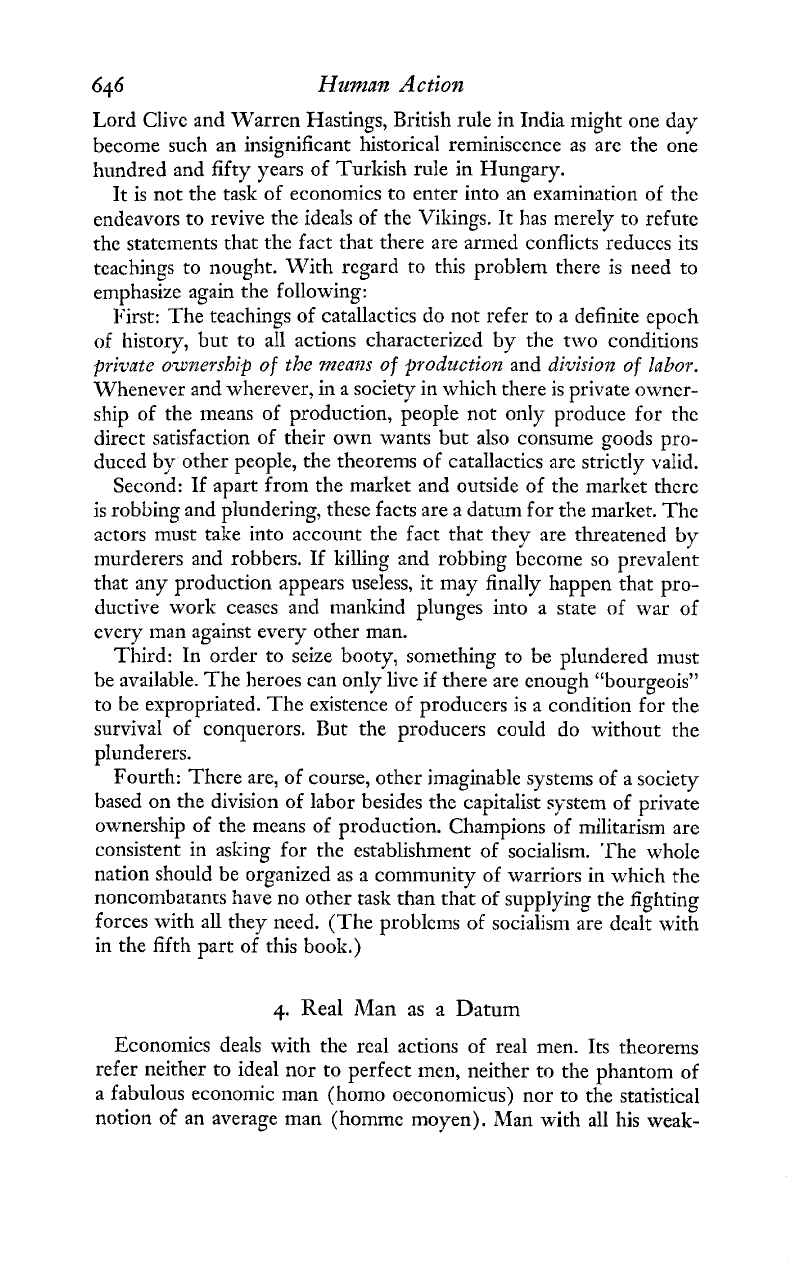
646
Human
Action
Lord Clive and Warren Hastings, British rule
in
India might one day
becol-ne such an insignificant historical reminiscence as are the one
hundred and fifty years of Turkish rule in Hungary.
It is not the task of economics to enter into an examination of the
endeavors to revive the ideals of the Vikings. It has merely to refute
the statements that the fact that there are armed conflicts reduces its
teachings to nought. W7ith regard to this problem there is need to
emphasize again the following:
I;irst: The teachings of catallactics do not refer to a definite epoch
of
history, but to a11 actions characterized by the two conditions
private ou;nershi+ of
the
nzeans of production
and
division
of labor.
Whenever and wherever, in a society in which there is private owner-
ship of the means of production, peopIe not only produce for the
direct satisfaction of their own wants but also consume goods pro-
duced by other people, the theorems of catallactics are strictly valid.
Second: If apart from the market and outside of the market there
is robbing and plundering, these facts are a datum for the market. The
actors must take into account the fact that they are threatened by
murderers
and robbers. If killing and robbing become so prcvalent
that any production appears useless, it may finally happen that pro-
ductive work ceases and mankind plunges into a state of war of
every man against every other man.
Third: In order to seize booty, something to be plundered must
be available. The heroes can only live if there are enough "bourgeois"
to be expropriated. The existence of producers is
a
condition for the
survival of conquerors. But the producers could do without the
plunderers.
Fourth: There are, of course, other imaginable systems of a society
based on the division of labor besides the capitalist system of private
ownership of the means of production. Champions of militarism are
consistent in asking for the establishment of socialism. 'The whole
nation should be organized as a community of warriors in which the
noncombatants have no other task than that of suppiying the fighting
forces with all they need. (The problems of socialism are dealt with
in the fifth part of this book.)
4.
Real
Man
as
a
Datum
Economics deals with the real actions of real men. Its theorems
refer neither to ideal nor to perfect men, neither to the phantom of
a fabulous economic man (homo oeconomicus) nor to the statistical
notion of an average man (homme moyen). Man with all his weak-
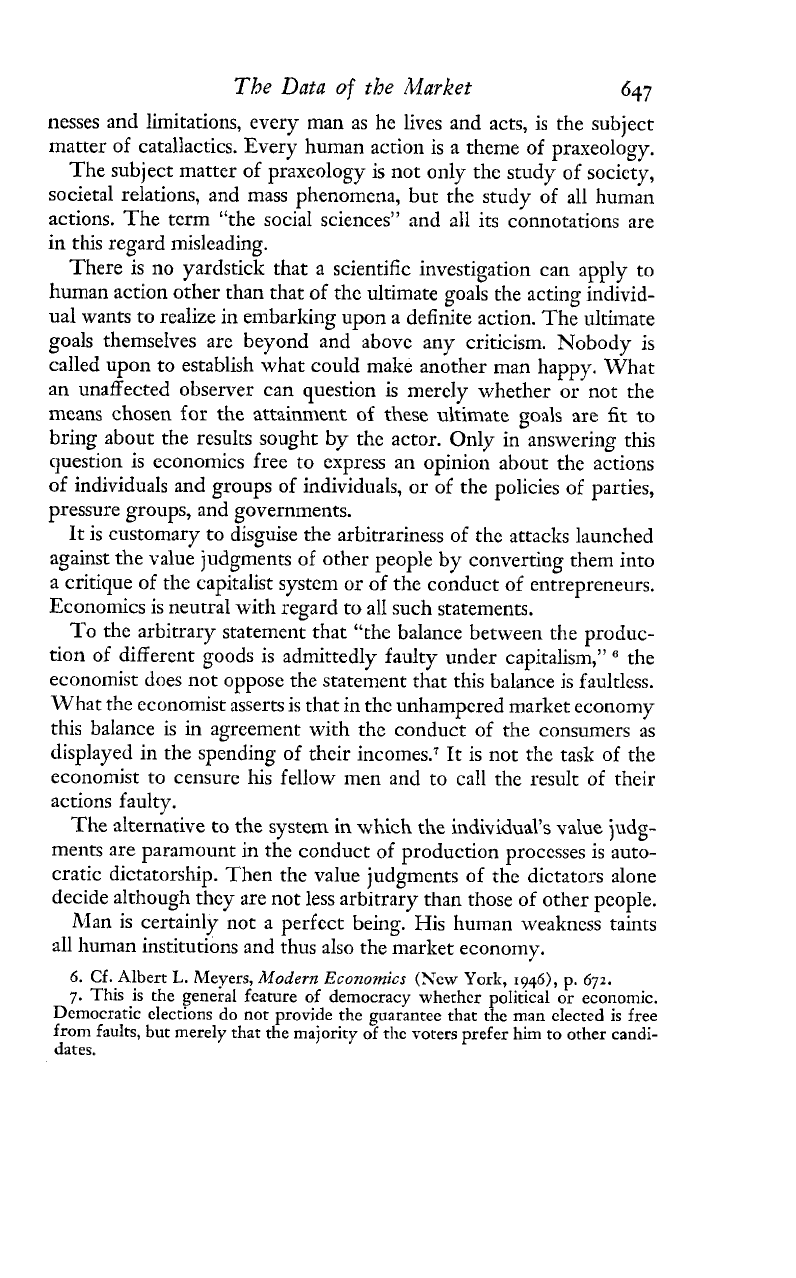
The
Data
of
the
Market
647
msses and limitations, every man as he lives and acts, is the subject
matter of catallactics. Every human action is
a
theme of praxeology.
The subject matter of praxeology is not only the study of society,
societal relations, and mass phenomena, but the study of all human
actions. The term "the social sciences" and all its connotations are
in this regard misleading.
There is no yardstick that a scientific investigation can apply to
human action other than that of the ultimate goals the acting individ-
ual wants to realize in embarking upon a definite action. The ultimate
goals themselves are beyond and abovc any criticism. Nobody is
called upon to establish what could make another man happy. What
an unaffected observer can question is merely whether or not the
means chosen for the attainment of these ultimate goals
are
fit
to
bring about the results sought
by
the actor. Only
in
answering this
question is economics free to express an opinion about the actions
of individuals and groups of individuals, or of the policies of parties,
pressure groups, and governments.
It is customary to disguise the arbitrariness of the attacks launched
against the value judgments of other people by converting them into
a critique of the capitalist system or of the conduct of entrepreneurs.
Economics is neutral with regard to a11 such statements.
To the arbitrary statement that "the balance between the produc-
tion of different goods is admittedly faulty under capitalism,"
e
the
economist does not oppose the statement that this balance is faultless.
L
What the economist asserts is that in the unhampered market economy
this balance is in agreement with the conduct of the consumers as
displayed in the spcnding of their inco~nes.~ It is not the task of the
economist to censure his fellow men and to call the result of their
actions faulty.
The alternative to the system
in
wGch the
individual's
value
judg-
ments are paramount in the conduct of production processes is auto-
cratic dictatorship. Then the value judgments of the dictators alone
decide although they are not less arbitrary than those of other people.
Man is certainly not a perfcct being. His human weakness taints
all human institutions and thus also the market economy.
6.
Cf.
Albert
L.
Meyers,
Modern Economics
(Ncw
York,
1946),
p.
672.
7.
This is the general feature of democracy whether poIitical or economic.
Democratic elections do not provide the guarantee that the man clectcd is free
from faults, but merely that the majority of the voters prefer him to other candi-
dates.
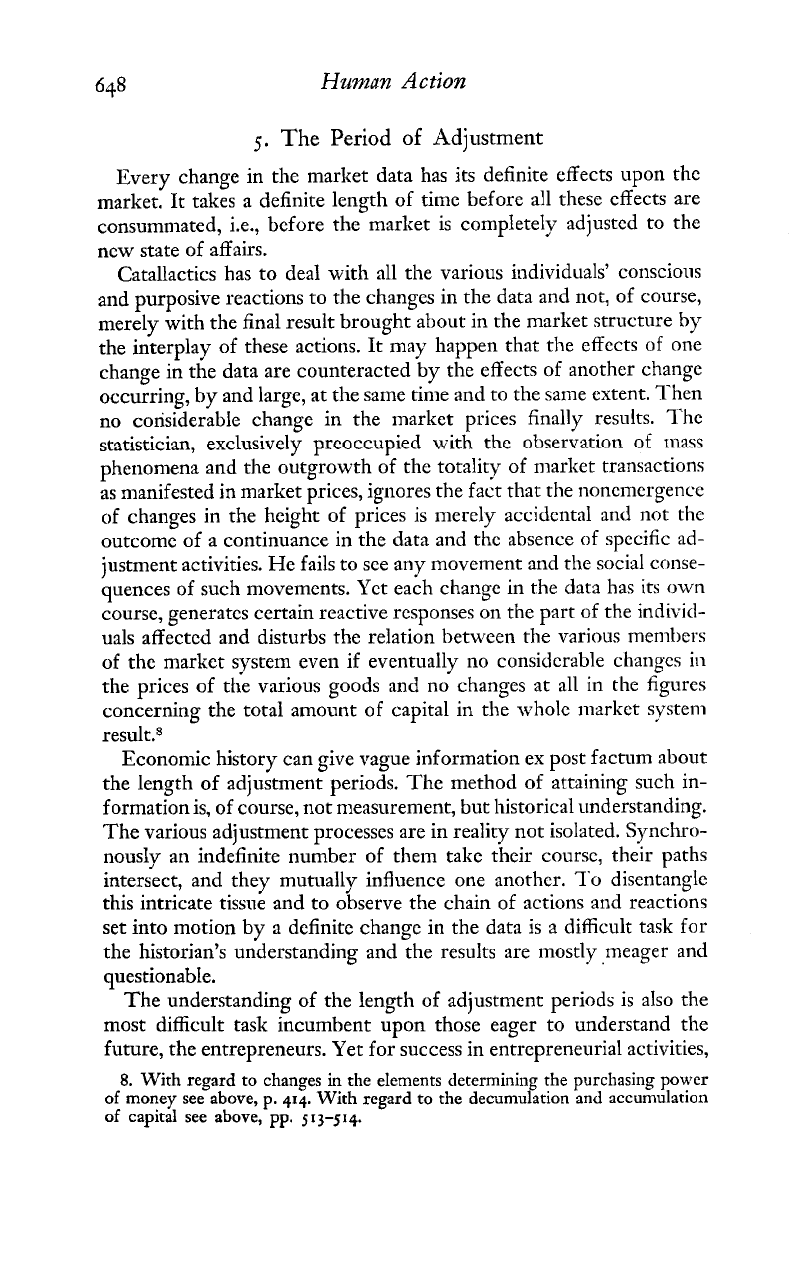
Human
Action
5.
The Period of Adjustment
Every change in the market data has its definite effects upon the
market. It takes a definite length of time before all these effects are
consummated, i.e., before the market is compIetely adjusted to the
new state of affairs.
Catallactics has to deal with all the various individuals' conscious
and purposive reactions to the changes in the data and not, of course,
merely with the final result brought about in the market structure by
the interplay of these actiotls. It may happen that the effects of one
change in the data are counteracted by the effects of another change
occurring, by and large, at the same time and to the same extent. Then
no considerable change
in
the market prices finally results. The
statistician, exclusively preoccupied with the observation of mass
phenomena and the outgrowth of the totality of market transactions
as manifested in market prices, ignores the fact that the nonemergence
of changes in the height of prices is merely accidental and not the
outcome of a continuance in the data and the absence
of
specific ad-
justment activities. He fails to see any movement and the social conse-
quences of such movements. Yet each change in the data has
it5
own
course, generates certain reactive responses on the part of the individ-
uals affected and disturbs the relation between the various merni)ess
of the market system even if eventually no considerable changes in
the prices of the various goods and no changes at all in the figures
concerning the total amount of capital in the whole market system
res~lt.~
Economic history can give vague information ex post factum about
the length of adjustment periods. The method of attaining such in-
formation is, of course, not measurement, but historical understanding.
The various adjustment processes are in reality not isolated. Synchro-
nously an indefinite number of them take their course, their paths
intersect, and they mutually influence one another. To disentangle
this intricate tissue and to observe the chain of actions and reactions
set into motion by a definite change in the data is
a
difficult task for
the historian's understanding and the results are mostly
.
.
meager and
questionable.
The understanding of the length of adjustment periods is also the
most difficult task incumbent upon those eager to understand the
future, the entrepreneurs. Yet for success in entrepreneurial activities,
8.
With regard to changes in the elements determining the purchasing power
of money see above,
p.
414.
With regard to the decumulation and accumulation
of capital see above, pp.
513-514.
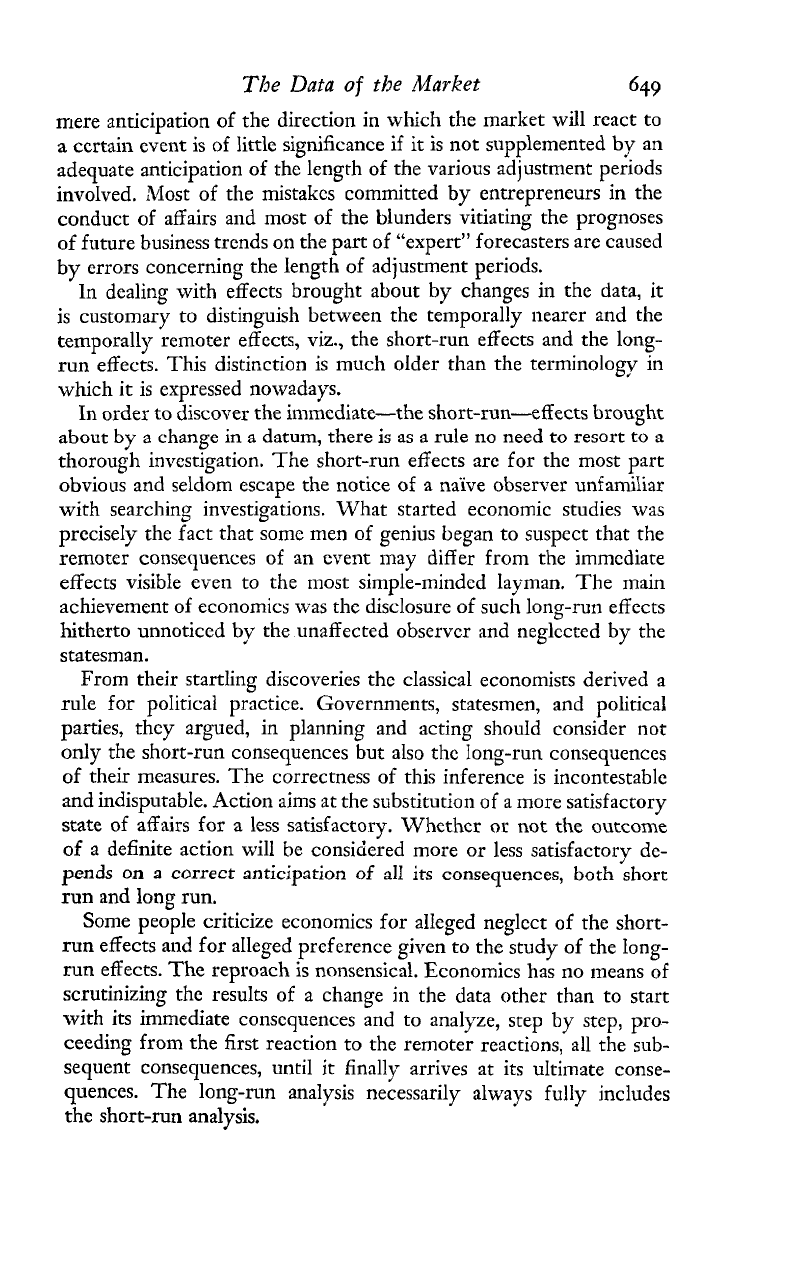
The Data
of
the Market
649
mere anticipation of the direction in which the market will react to
a
ccrtain event
is
of little significance
if
it
is not supplemented bv an
adequate anticipation of the length of the various adjustment pe;iods
involved. Most of the mistakes committed by entrepreneurs in the
conduct of affairs and most of the blunders vitiating the prognoses
of future business trends on the part of "expert" forecasters arc caused
by errors concerning the length of adjustment periods.
In dealing with effects brought about by changes in the data, it
is customary to distinguish between the temporally nearer and the
temporally remoter effects, viz., the short-run effects and the long-
run effects. This distinction is much older than the terminology in
which it is expressed nowadays.
In
order to discover the immediate-the short-run-effects brought
about by a change in a datum, there is as a rule no need to resort to
a
thorough investigation. The short-run effects are for the most part
obvious and seldom escape the notice of a na'ive observer unfamiliar
with searching investigations. What started economic studies was
precisely the fact that some men of genius began to suspect that the
remoter consequences of an event may differ from the immediate
effects visibIe even to the most simple-minded layman. The main
achievement of economics was thc disclosure of such long-run effects
hitherto unnoticed by the unaffected observer and neglected by the
statesman.
From their startling discoveries the classical economiscs derived a
rule for political practice. Governments, statesmen, and political
parties, they argued, in planning and acting should consider not
only the short-run consequences but also the Iong-run consequences
of their measures. The correctness of this inference is incontestable
and indisputable. Action aims at the substitution of a more satisfacrory
state of affairs for a less satisfactory. Whether
or
not the outcome
of a definite action will be considered more or less satisfactory de-
pends on a correct anticipation of a11 its consequences, both short
run and long run.
Some people criticize economics for alleged neglect of the short-
run effects and for alleged preference given to the study of the Iong-
run effects.
The
reproach is nonsensical. Economics has no means of
scrutinizing the results of a change in the data other than to start
with its immediate consequences and to analyze, step by step, pro-
ceeding from the first reaction to the remoter reactions, all the sub-
sequent consequences, until it finally arrives at its ultimate conse-
quences. The long-run analysis necessarily always fully includes
the short-run analysis.
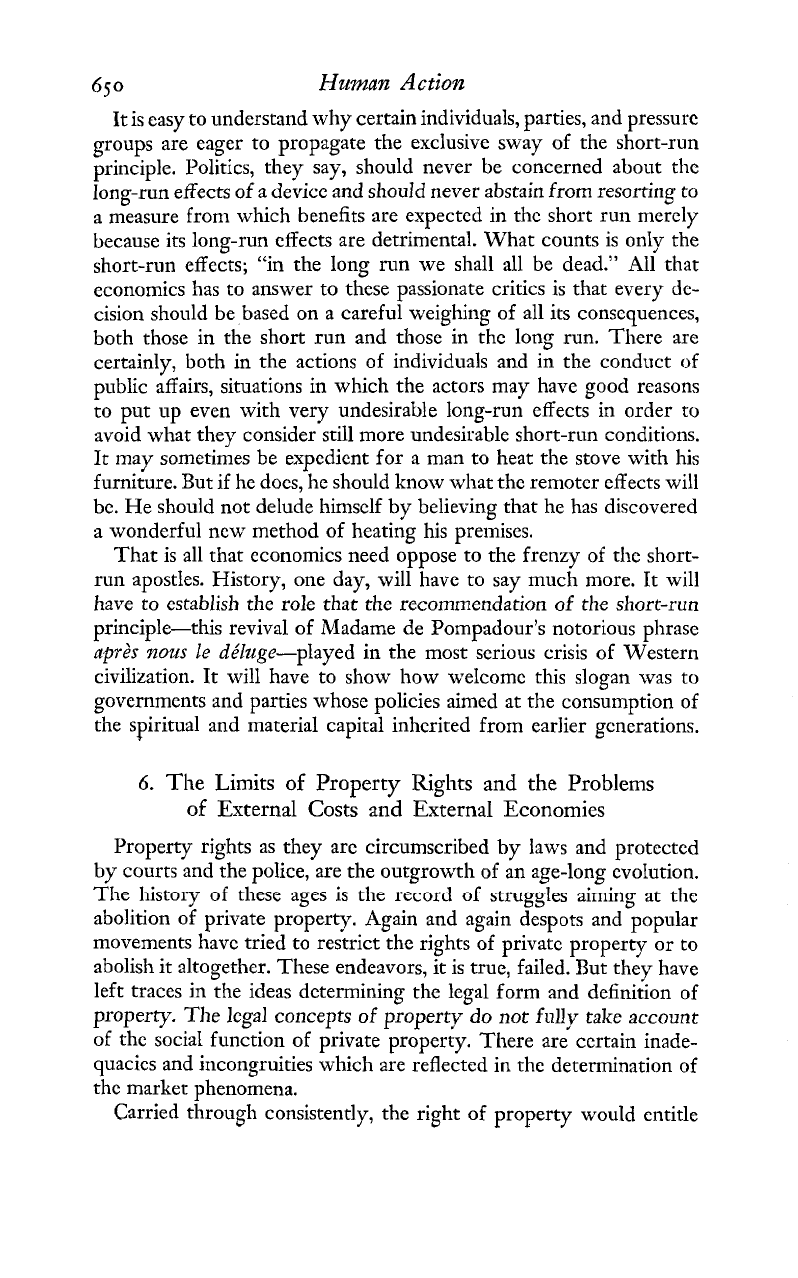
650
Human
Action
It is easy to understand why certain individuals, parties, and pressure
groups are eager to propagate the exclusive sway of the short-run
principle. Politics, they say, should never be concerned about the
long-run effects of
a
device and should never abstain from resorting to
a measure from which benefits are expected in the short run merely
because its long-run effects are detrimental. What counts is only the
short-run effects; "in the long run we shall all be dead." All that
economics has to answer to these passionate critics is that every de-
cision should be based on a careful weighing of all its consequences,
both those in the short run and those in the long run. There are
certainly, both in the actions of individuals and in the conduct of
public affairs, situations in which the actors may have good reasons
to put up even with very undesirable long-run effects in order to
avoid what they consider still more undesirable short-run conditions.
It may sometimes be expedient for
a
man to heat the stove with his
furniture. But if he does, he should know what the remoter effects will
be. He should not delude himself by believing that he has discovered
a wonderful new method of heating his premises.
That is all that economics need oppose to the frenzy of the short-
run apostIes. History, one day, will have to say much more. It will
have to establish the role that the recommendation of the short-run
principle-this revival of Madame de Pompadour's notorious phrase
apr2s
nous
le
de'luge-played in the most serious crisis of Western
civilization. It will have to show how weIcome this slogan was to
governments and parties whose policies aimed at the consumption of
the spiritual and material capital inherited from earlier generations.
6.
The Limits of Property Rights and the Problems
of External Costs
and
External Economies
Property rights as they arc circumscribed by laws and protected
by courts and the police, are the outgrowth of an age-long evolution.
The history of these ages is the record of struggles aiming at the
abolition of private properw. Again and again despots and popular
movements have tried to restrict the rights of private property or to
abolish it altogether. These endeavors, it is true, failed. But they have
left traces
in
the ideas determining the legal form and definition of
property. The legal concepts of property
do
not fully take account
of the social function of private property. There are certain inade-
quacies and incongruities which are reflected in the determination of
the market phenomena.
Carried through consistently, the right of property would entitle
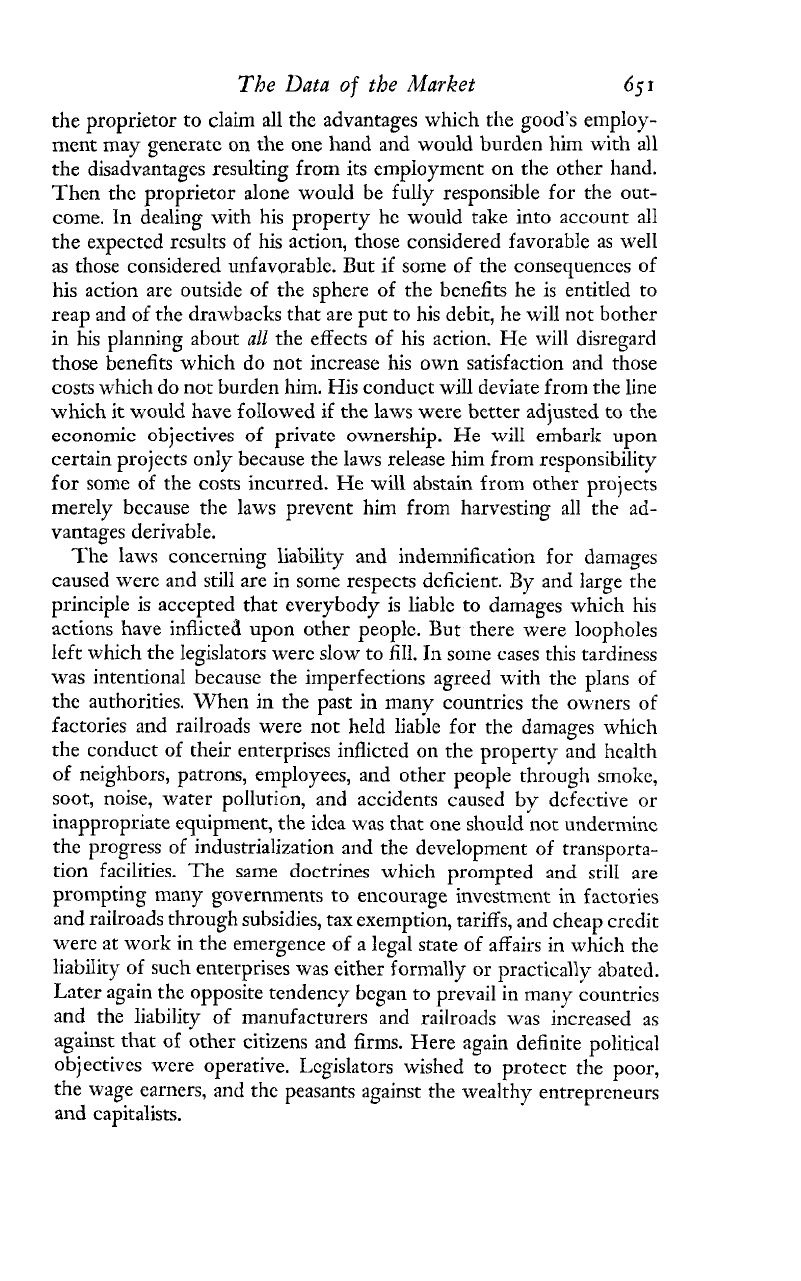
The
Data
of
the
Market
651
the proprietor to claim all the advantages which the good's employ-
ment may generate on the one hand and would burden him with all
the disadvantages resulting from its employment on the other hand.
Then the proprietor alone would be fully responsible for the out-
come.
In
dealing with his property he would take into account all
the expected results of his action, those considered favorable as well
as those considered unfavorable. But if some of the consequences of
his action are outside of the sphere of the benefits he is entitled to
reap and of the drawbacks that are put to his debit, he will not bother
in his planning about
all
the effects of his action. He will disregard
those benefits which do not increase his own satisfaction and those
costs which do not burden him. His conduct will deviate from the line
which it would have followed if the laws were better adjusted
to
the
economic objectives of privatc ownership. He wilI embark upon
certain projects only because the laws release him from responsibility
for some of the costs incurred.
He
will abstain from other projects
merely because the laws prevent him from harvesting all the ad-
vantages derivable.
The laws concerning liability and indemnification for damages
caused were and still are in sorne respects deficient. By and large the
principle is accepted that everybody is liable to damages which his
actions have inflicted upon other people. But there were loopholes
left which the legislators were slow to fill. In sorne cases this tardiness
was intentional because the imperfections agreed with the plans of
the authorities. When in the past in many countries the owners of
factories and railroads were not held liagle for the damages which
the conduct of their enterprises inflicted on the property and health
of neighbors, patrons, employees, and other people through smoke,
soot, noise, water pollution, and accidents caused by defective or
inappropriate equipment, the idea was that one should not undermine
the progress of industrialization and the development of transporta-
tion facilities. The same doctrines which prompted and srilI are
prompting many governments to encourage investment in factories
and railroads through subsidies, tax exemption, tariffs, and cheap credit
were at work
in
the emergence of a legal state of affairs in which the
liability of such enterprises was either formally or practically abated.
Later again the opposite tendency began to prevail in many countries
and the liability of manufacturers and railroads was ikreased as
against that
of
other citizens and firms. Here again definite political
objectives were operative. 1,egislators wished to protect the poor,
the wage earners, and the peasants against the wealthy entrepreneurs
and capitalists.
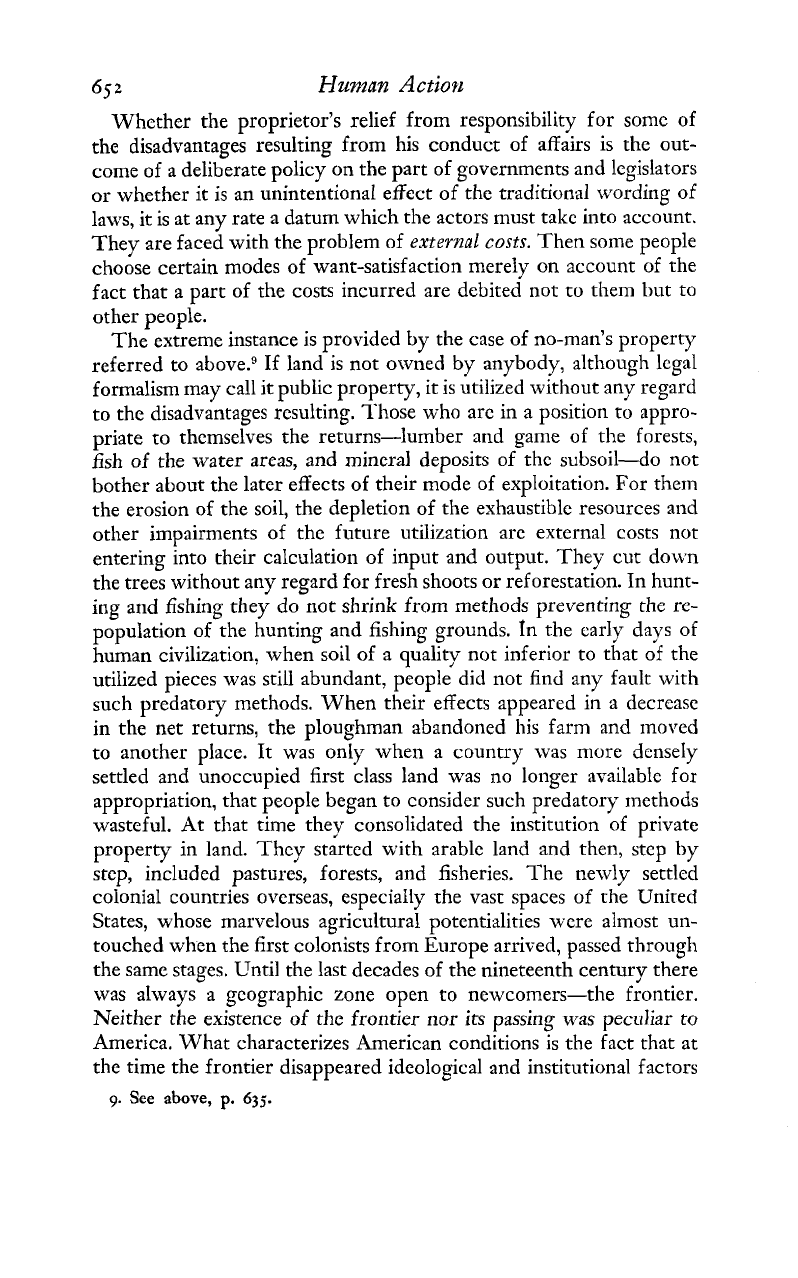
652
Human
Action
Whcther the proprietor's relief from responsibility for somc of
the disadvantages resulting from his conduct of affairs is the out-
come of a deliberate policy on the part of governments and legislators
or whether it is an unintentional effect of the traditional wording of
laws, it is at any rate a datum which the actors must take into account.
They are faced with the problem of
external
costs.
Then some people
choose certain modes of want-satisfaction merely on account of the
fact that a part of the costs incurred are debited not to them but to
other peopfe.
The extreme instance is provided
by
the case of no-man's property
referred to above.g If land is not owned by anybody, although legal
formalism may call it public property, it is utilized without any regard
to the disadvantages resulting. Those who are in a position to appro-
priate to themselves the returns-lumber and game of the forests,
fish of the water areas, and mineral deposits of the subsoil-do not
bother about the later effects of their mode of exploitation. For them
the erosion of the soil, the depletion of the exhaustible resources and
other impairments of the future utilization are external costs not
entering into their calculation of input and output. They cut dowm
the trees without any regard for fresh shoots or reforestation. In hunt-
ing and fishing they do not shrink from methods prcventing
the
re-
population of the hunting and fishing grounds. In the early days of
human civilization, when soil of a quality not inferior to that of the
utilized pieces was still abundant, people did not find any fault with
such predatory methods. When their effects appeared in a decrease
in the net returns, the ploughman abandoned his farm and moved
to another place. It was only when a country was more densely
settled and unoccupied first class land was no longer available for
appropriation, that people began to consider such predatory methods
wasteful. At that time they consolidated the institution of private
property in land. They started with arable land and then, step by
step, included pastures, forests, and fisheries. The newly settlcd
colonial countries overseas, especially the vast spaces of the United
States, whose marvelous agricultural potentialities were almost un-
touched when the first colonists from Europe arrived, passed through
the same stages. Until the last decades of the nineteenth century there
was always a geographic zone open to newcomers-the frontier.
Neither the existence of
the
frontier nor
its
passing was peculiar to
America. What characterizes American conditions is the fact that at
the time the frontier disappeared ideological and institutional factors
9.
See
above,
p.
63j.
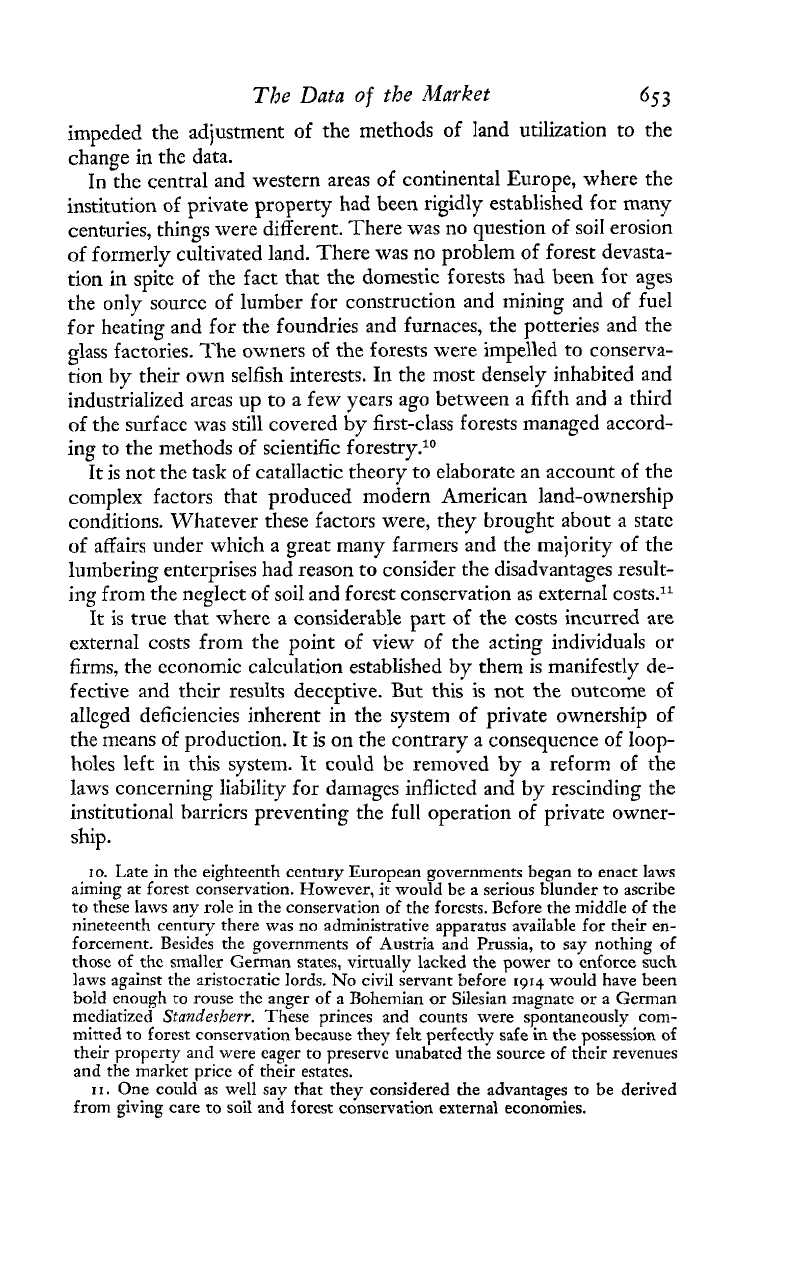
The Data
of
the
Market
impeded the adjustment of the methods of land utilization to the
change in thc data.
In the central and western areas of continental Europe, where the
institution of private property had been rigidly established for many
centuries,
things were different. There was no question of soil erosion
of formerly cultivated land. There was no problem of forest devasta-
tion
in
spite of the fact that the domestic forests had been for ages
the only source of lumber for construction and mining and of fuel
for heating and for the foundries and furnaces, the potteries and the
glass factories. The owners of the forests were impelled to conserva-
tion by their own selfish interests. In the most densely inhabited and
industrialized areas up to a few years ago between a fifth and a third
of the s~~rfacc was still covered by first-class forests managed accord-
ing to the methods of scientific forestry.1°
It is not the task of catallactic theory to elaborate an account of the
complex factors that produced modern American land-ownership
conditions. Whatever these factors were, they brought about a state
of affairs under which a great many farmers and the majority of the
lumbering enterprises had reason to consider the disadvantages result-
ing from the neglect of soil and forest conservation as external costs.ll
It is true that where a considerable part of the costs incurred are
external costs from the point of view of the acting individuals or
firms, the economic cakulation established by them is manifestly de-
fective and their results deceptive. But this is not the outcome of
alleged deficiencies inherent in the system of private ownership of
the means of production. It
is
on the contrary a consequence of loop-
holes left
in
this system.
It
could be removed by a reform of the
laws concerning liability for damages inflictcd and by rescinding the
institutional barriers preventing the full operation of private owner-
ship.
10.
Late in the eighteenth century European governments began to enact laws
aiming at forest conservation. However, it would be a serious blunder to ascribe
to these laws any role in the conservation of the forests. Before the middle of the
nineteenth century there was no administrative apparatus available for their en-
forcement. Besides the governments of Austria and Prussia, to say nothing of
those of the smaller German states, virtually lacked the power to enforce
such
laws against the aristocratic lords. No civil servant before
t914
would have been
bold enough to rouse the anger of a Bohemian or Silesian magnate or a German
mediatized
Standeshe~r.
These princes and counts were spontaneously com-
mitted to forest conservation because they felt perfectly safe
in
the possession
of
their property and were eager to preserve unabated the source of their revenues
and the market price of their estates.
11.
One could as well
sav
that they considered the advantages to be derived
from giving care to soil and forest conservation external economies.
